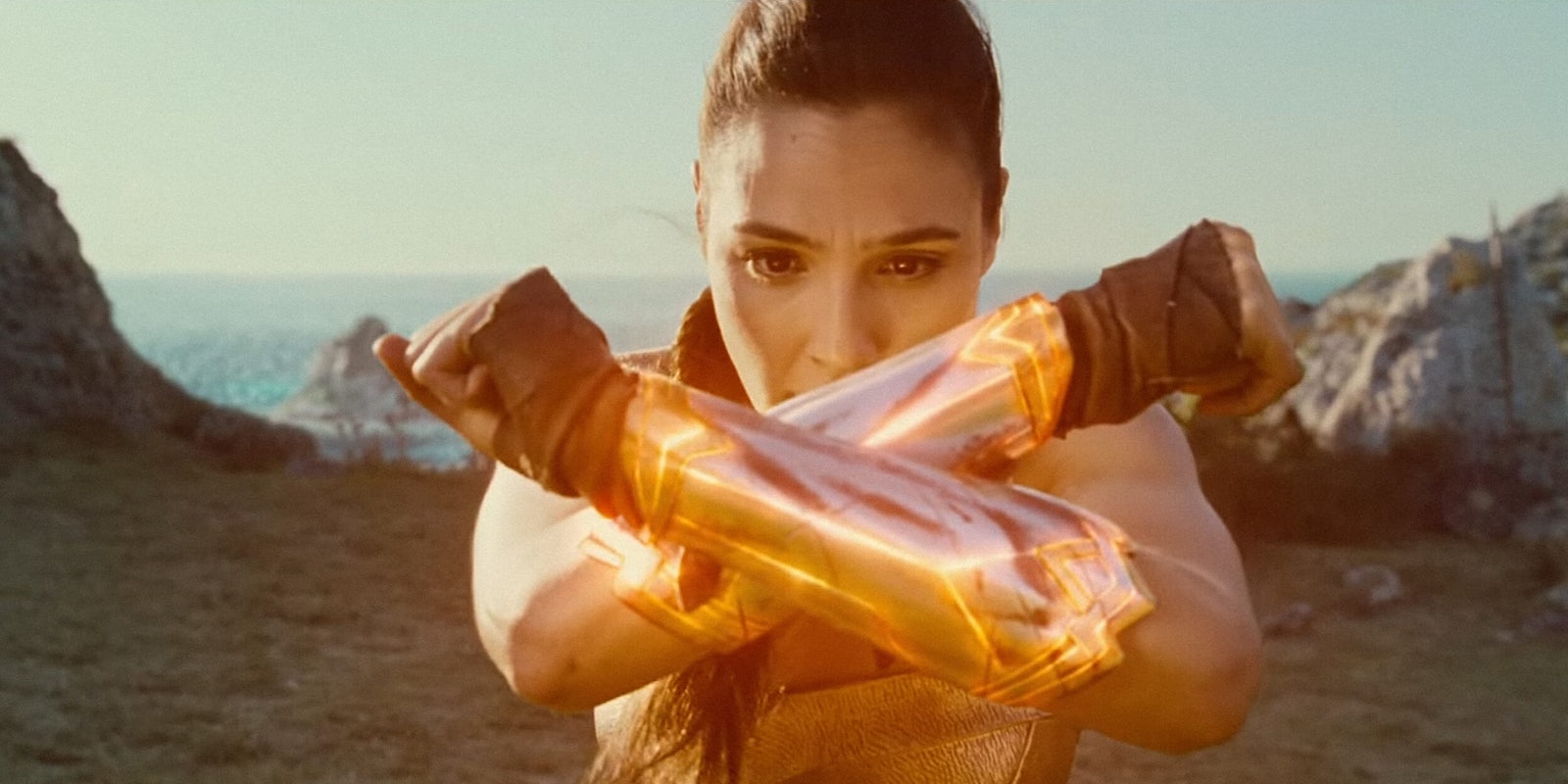Wonder Woman topped the U.S. box office on its opening weekend with an incredible $103.1 million, which greatly exceeded expectations and gave director Patty Jenkins the biggest domestic opening ever for a woman. The film’s critical and financial success is already sparking plenty of conversation—and it’s likely to continue.
For one, we’ll hear about the demographics of moviegoers: Women made up the majority of Wonder Woman’s audience at 52 percent, compared to other superhero movies, which tend to skew toward male audiences. We’ll look at the effect Wonder Woman will have on the children who will grow up seeing a female superhero lead her own film—but especially young girls—along with its lack of representation among much of the main cast. Critics will examine the dynamics of the film’s setting of World War I, the equal and respectful relationship between Diana Prince and Steve Trevor, and the many ways Wonder Woman subverts action movie tropes, even when it follows the rulebook of a superhero film.
Many will point to the triumph of Jenkins and what it might mean for female directors in Hollywood. Wonder Woman faced massive pressure to succeed—in part because what it could mean for the future of female leads and directors in major franchise films. Even after positive reviews, Jenkins was still called a “gamble” by an industry trade publication as recently as two days before Wonder Woman opened in the U.S. (Numerous male directors who were given similar chances before her didn’t face that same level of pressure. While some may have been called gambles, they didn’t risk casting a shadow over other male directors or male-led movies in the process.)
It’s a conversation many of us have seen, heard, or had before, even those who don’t pay much attention to Hollywood scuttlebutt. Still, some parts of the movie business remain resistent to make movies starring women and people of color .
https://twitter.com/jennyjaffe/status/871076997170028545
Hollywood has, once again, found itself surprised that women will go see a movie starring a woman—and now a female-led superhero movie directed by a woman—despite the fact that women make up the majority of moviegoers. But it really shouldn’t be a surprise. We’ve seen this play out many times over the past decade at least, and Hollywood has yet to take the hint.
In 2008, Twilight, directed by Catherine Hardwicke, made $69.6 million domestically at the box office its first weekend in theaters and exceeded Summit Entertainment’s expectations with women and girls making up 75 percent of the audience. Sam Taylor-Johnson’s Fifty Shades of Grey, which held the record for the highest-grossing opening for a female director until Wonder Woman’s release, went into “uncharted territory” with a $94.4 million domestic debut in 2015; women made up 78 percent of the audience. Sequels to both Fifty Shades of Grey and Twilight were directed by men.
The four Hunger Games movies, which starred Jennifer Lawrence as Katniss Everdeen, made more than $1.45 billion between four movies. And the two most recent Star Wars films are in a league of their own: Star Wars: The Force Awakens and Rogue One featured ensemble casts that put their female characters—Daisy Ridley’s Rey and Felicity Jones’ Jyn Erso—at the forefront of larger stories. Part of the reason The Force Awakens, which broke nearly every box office record in existence, was such a major success was because of the women and girls who went to see it after the movie’s initial opening.
Films starring people of color that are major successes at the box office are also treated as anomalies, some of them because of the myth—one that’s been disproven time and again but still persists in parts of the industry—that “black films don’t travel.” (Studies have shown that movies with diverse casts are more successful.)
So let’s review:
— Darth Kriss (@insanityreport) June 5, 2017
– Straight Outta Compton
– Hidden Figures
– Wonder Woman
examples of films that “over performed expectations”
Straight Outta Compton, the 2015 biopic about the members of N.W.A., made $161.1 million domestically and $201.6 worldwide while Ryan Coogler’s Creed broke the $100 million mark in the U.S. alone. (It would make $173.5 million worldwide.) Moonlight, the 2017 Best Picture Oscar winner, more than doubled its domestic total in international theaters with a total of $65 million worldwide.
Hidden Figures, the historical drama starring Taraji P. Henson, Janelle Monáe, and Octavia Spencer as the real-life NASA employees who helped put John Glenn into orbit, made more than $229 million globally and sparked a similar conversation about what Hollywood would learn from it. Both The Force Awakens and Rogue One had more inclusive casts than their predecessors. Fate of the Furious, directed by F. Gary Gray, crossed $1 billion worldwide with its inclusive cast and became the highest-grossing film from African American director. And Get Out, Jordan Peele’s directorial debut, is one of the most successful films of 2017 after grossing more than $247 million worldwide on a film that had a $4.5 million budget. It debuted to critical acclaim and its popularity spread through word-of-mouth and recommendations that it should be seen in a movie theater.
Meanwhile, other movies geared toward a larger audience (and what you might consider generic movie fodder) floundered. Ghost in the Shell—which whitewashed its lead character from the original anime—flopped, the Johnny Depp-starring Pirates of the Caribbean: Dead Men Tell No Tales underperformed, and Baywatch landed in the shallow water.
Hollywood is starting to embrace more female-led stories in cinema, although the statistics on female directors have actually decreased in the past year. Will the success of films like Wonder Woman, Get Out, and Hidden Figures finally convince Hollywood to put more women and people of color behind the camera to tell their stories? One can hope, after all.
But don’t be surprised if we’re still having this conversation when Star Wars: The Last Jedi and Black Panther are released.


